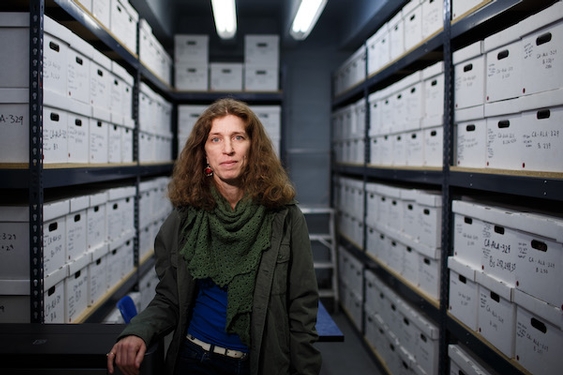A controversial anthropology professor at San Jose State, who contended she was a victim of a “woke activist mob” for opposing the repatriation of Native American remains and posing in a photo with an ancient skull, has agreed to leave the university next year.
Professor Elizabeth Weiss and the university reached a settlement that allows her to retire with full benefits at the end of the 2023-2024 school year, after she claimed in a lawsuit that the university retaliated against her and violated her First Amendment rights when it locked her out of the collection of skeletal remains.
Weiss and the university “have reached an agreement in which she has voluntarily submitted her resignation effective May 29, 2024, and will dismiss her lawsuit,” the university said in a statement. “Dr. Weiss will remain a member of the SJSU faculty through the 2023-24 academic year.”
Instead of working on the San Jose campus, however, she will be in New York City as a fellow at the Heterodox Academy’s Center for Academic Pluralism, according to her lawyer David Hoffa from the Pacific Legal Foundation, a libertarian law firm representing individual liberty cases. The legal journal Law360 first reported the settlement on Friday.
Weiss’s views opposing repatriation — believing it favors religion over research — and posing with the skull caused a fury in the academic world, including from the university provost, and once again pitted academic freedom and First Amendment rights against cultural sensitivity.
Weiss, a professor at San Jose State since 2004, had claimed she was the target of cancel culture after tweeting a photo of herself returning to campus after COVID lockdowns, holding a skull with her bare hands and writing: “So happy to be back with some old friends.”
After intense backlash to her tweet, the university closed off the collection of remains to Weiss, as well as everyone else.
Weiss had hoped her lawsuit would pressure the university to reopen the collection to her, but it never did. During settlement negotiations, she was able to continue speaking about her views opposing repatriation in the classroom as well as host speakers from other universities, Hoffa said.
“She felt that at this time in the current climate with some of the restrictions on the studying of skeletal remains and other things that are in the works regarding repatriation that her opportunities at the university may not have been as great as she was hoping,” Hoffa said in an interview Monday. “So by retiring at this time, she’ll be able to get her retirement and then she’ll pursue other more fruitful opportunities.”
-------
©#YR@ MediaNews Group, Inc. Visit at mercurynews.com. Distributed by Tribune Content Agency, LLC.





